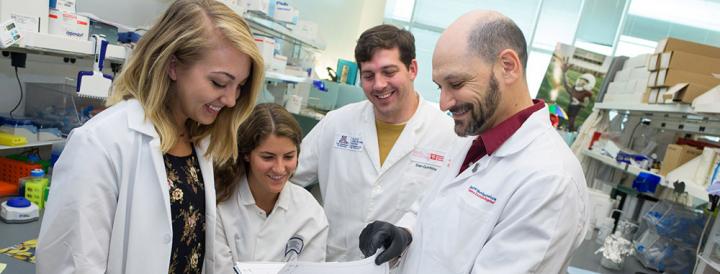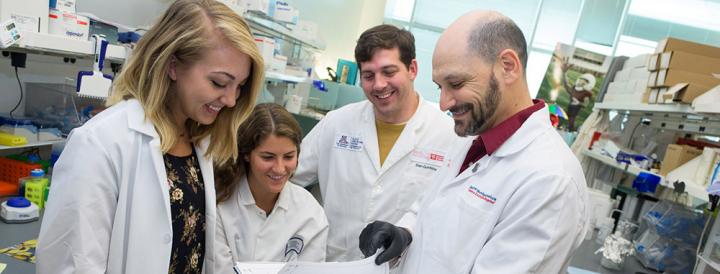
Credit: Sun Czar Belous
The U.S. Department of Defense has awarded a team of scientists and physicians from leading health care institutions across Phoenix a $1.3 million grant over three years to study traumatic brain injury and its relationship to dementia.
The collaboration is between the University of Arizona College of Medicine – Phoenix, the Phoenix Veterans Affairs Health Care System, Phoenix Children's Hospital, Barrow Neurological Institute and Arizona State University.
Jonathan Lifshitz, PhD, Director of the Translational Neurotrauma Research Program at the College of Medicine – Phoenix and Phoenix Children's Hospital, and Raymond Migrino, MD, a cardiovascular specialist from the Phoenix VA and clinical professor in the Department of Medicine at the College, are the Joint Principal Investigators for the study that seeks to understand how traumatic brain injury incurred at a young age can contribute to the development of dementia at a later age.
The proposal also will explore how cardiovascular risk factors, such as diabetes, increase susceptibility to later cognitive dysfunction in those exposed to traumatic brain injury. The investigators will look at the contribution of impaired blood vessel function as the common link among traumatic brain injury, diabetes and dementia.
"This partnership between multiple institutions symbolizes the mission and vision for the College of Medicine – Phoenix, which is to do collaborative and clinically relevant research that will advance health care," said Guy Reed, MD, MS, Dean of the College of Medicine – Phoenix Guy Reed. "Four institutions and valued partners will be working together to advance science and understanding on this important topic that impacts our community."
The grant represents the first one the College of Medicine – Phoenix has received from the Department of Defense.
"We bring together Valley-wide expertise to understand the way in which life events – TBI, diabetes – interact over time to accumulate risk factors for new diseases – cardiovascular, dementia," Dr. Lifshitz said. "This study is a concerted effort to understand the long-term interactions between disease processes."
The multidisciplinary team includes Rayna Gonzales, PhD, an associate professor and Vascular Physiology researcher in the Department of Basic Medical Sciences at the College; Chad Quarles, PhD and Greg Turner, PhD at Barrow Neurological Institute Imaging Center; endocrinologist Peter Reaven, MD, and neurologist Patricio Reyes, MD, from the Phoenix VA, and Diego Mastroeni, PhD, an assistant research professor at Arizona State University's Neurodegenerative Disease Research Center.
"We want to understand how each experience in life is going to impact the risk of future health and disease-related processes," Dr. Lifshitz said. "We want to know if there is a cumulative effect of these risk factors, or if they are individual and independent."
The collaborations between multiple institutions will allow the research team to discover findings that no one individual could do alone.
Of the collaborations, Dr. Migrino's lab at the Phoenix VA will measure the function of brain blood vessels isolated from the animal model of traumatic brain injury implemented by Dr. Lifshitz, and determine the relationship with measures of cognitive function, including how development of diabetes can modulate the effects of antecedent traumatic brain injury.
Dr. Mastroeni has a laboratory at ASU that optimizes the use of cell-specific genomic assays by exploiting laser capture microdissection, and measuring gene expression signals from known cell classes.
"The laser capture technology will allow us to isolate specific cells, and ask specific questions of the exact classes of cells involved in vascular dysfunction and vascular inflammatory signaling following traumatic brain injury," Dr. Mastroeni said. "Because array expression data typically rely on brain homogenates, identification of expression changes specific to any one cell class is limited. Information about the many greater number of genes common to vascular and other central nervous system cell types is lost using the traditional homogenate approach, hence the use of our novel approach."
Dr. Quarles' lab at Barrow will play an important role in the project by looking at clinical correlated of TBI-induced abnormalities in regional cerebral perfusion and vasoreactivity using non-invasive imaging measures. Dr. Quarles said these measures are critical to testing the underlying hypothesis that chronic brain hypoperfusion and impaired vasoreactivity contribute to the eventual development of neurodegeneration.
###
About The University of Arizona College of Medicine – Phoenix
The University of Arizona College of Medicine – Phoenix admitted its inaugural class of first-year medical students in August 2007 and is celebrating its 10th anniversary this year. The College inspires and trains exemplary physicians, scientists and leaders to optimize health and health care in Arizona and beyond. The College is uniquely positioned to accelerate the biomedical and economic engines in Phoenix and the State by leveraging vital relationships with key clinical and community partners. For more, visit phoenixmed.arizona.edu/tenyears.
Media Contact
Teresa Joseph
[email protected]zona.edu
602-827-2657
http://uahs.arizona.edu/
Original Source
http://phoenixmed.arizona.edu/about/news/researchers-receive-dod-grant-study-link-between-traumatic-brain-injury-and-dementia





